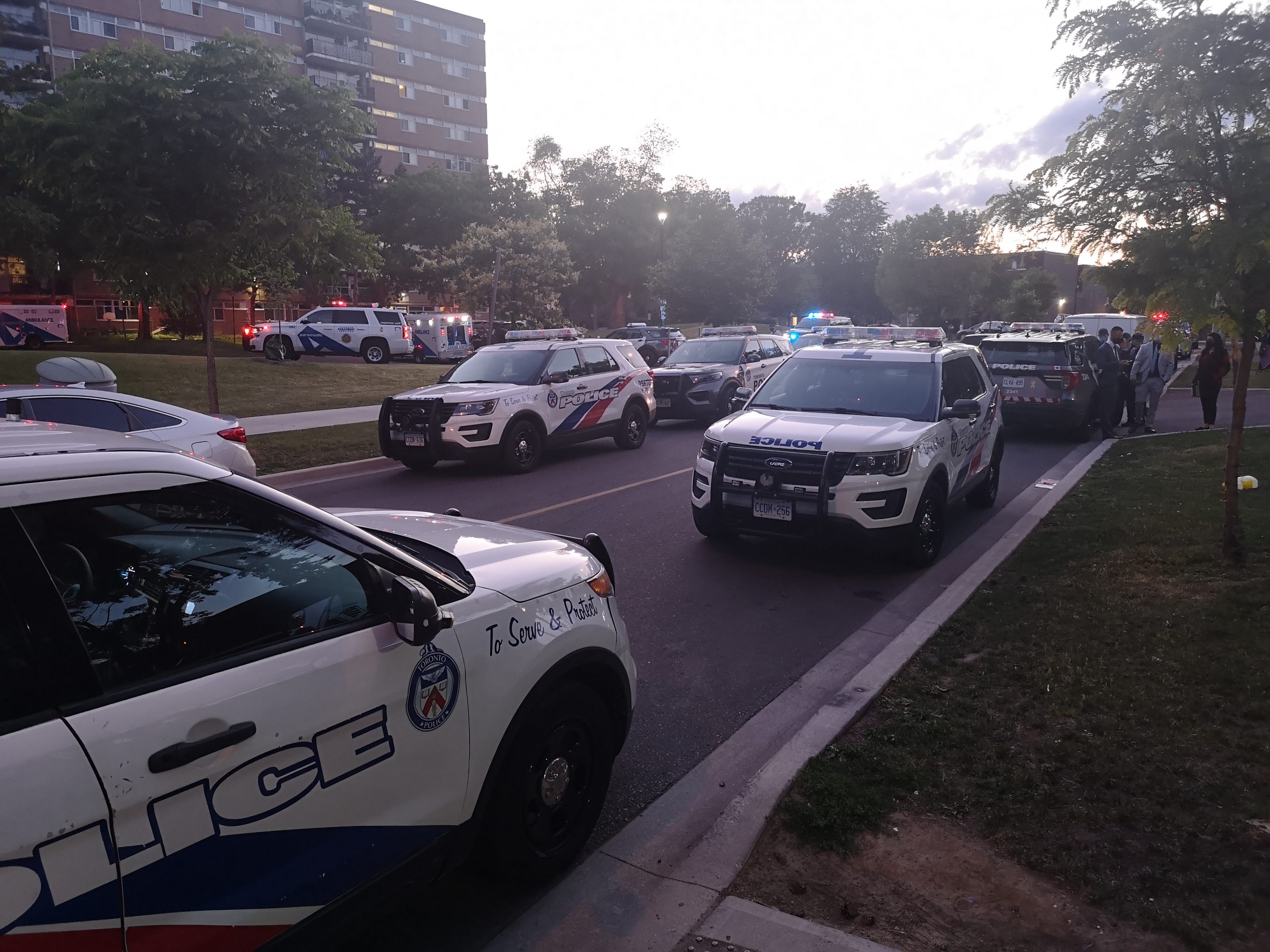Toronto police have charged a man in connection to a shooting at a child’s birthday party in Rexdale on Saturday that sent three children to hospital, one with life-threatening injuries.
Police say the accused, Demar Cadogan, was the lone adult injured in the incident.
Cadogan, who was shot in the leg, is now facing four gun charges, including discharge firearm with intent.
Earlier Monday, police said two of the children injured in the gunfire have been released from hospital while a five-year-old girl remains in critical condition.
Emergency crews were called to a home in Rexdale around 8 p.m. Saturday for a shooting at a birthday for a one-year-old boy.
According to police, the boy was grazed by a bullet while an 11-year-old boy was shot in the buttocks.
Cadogan is the first person arrested in the case, but police say there are multiple suspects.
The brazen shooting outraged local politicians.
Premier Doug Ford called the shooting “inconceivable and beyond comprehension,” adding the “perpetrators must be found and brought to justice.”
Mayor John Tory issued a statement Sunday morning saying firing a gun in Toronto is unacceptable “anywhere anytime,” but “doing so at a child’s birthday party goes way beyond that.”
Veteran police Superintendent Ron Taverner called it “one of the most disturbing scenes” he’s seen in his long career.
“It’s disgusting,” Taverner said Sunday. “As much as this is a horrific, horrific situation, it could have been worse. There could be three dead children.”
Emmalyn, who attended the party with her son, said the ramifications of the violence will be long-lasting.
“These kids are going to remember this. It’s summertime, these kids are supposed to be eating ice cream, playing games. I’m lost for words because I don’t know what to say.”
“To know that you were here, you seen the atmosphere and know that 80 per cent of the people that were here were children. Your heartless, your cold, bottom line.”
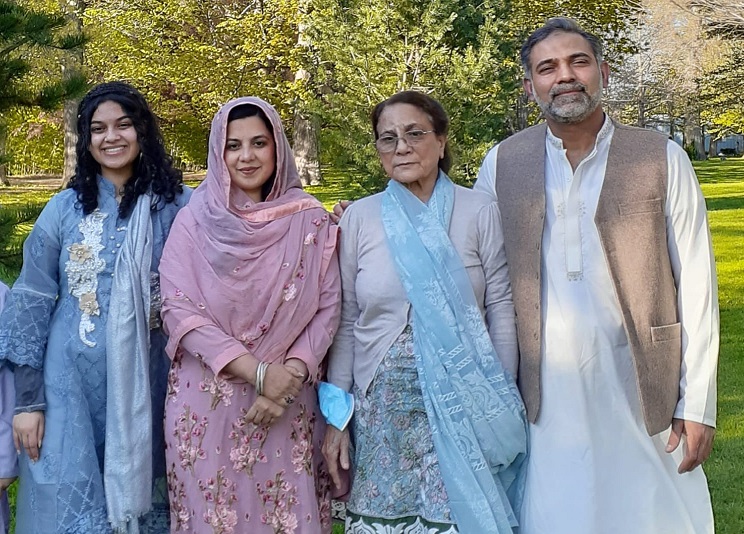
A man facing terrorism charges for allegedly targeting and killing a Muslim family with his truck in southwestern Ontario appeared in court via video on Monday.
Nathaniel Veltman, 20, faces four first-degree murder charges and an attempted murder charge that prosecutors allege constitute an act of terrorism.
Veltman, who is in the process of retaining a lawyer, stood quietly with his hands clasped in front of him as he appeared via video wearing orange prison-issued clothing.
His next court date has been scheduled for June 28.
Police have said the attack on June 6 in London, Ont., was motivated by hate against the Islamic faith.
Salman Afzaal, 46, his 44-year-old wife Madiha Salman, their 15-year-old daughter Yumna and her 74-year-old grandmother, Talat Afzaal were killed while out for an evening walk.
The couple’s nine-year-old son, Fayez, was seriously hurt.
The attack prompted a massive outpouring of support for the family and calls for all levels of government to address Islamophobia.

Las Vegas Raiders defensive end Carl Nassib on Monday became the first active NFL player to come out as gay.
Nassib, who is entering his sixth NFL season and second with the Raiders, announced the news on Instagram, saying he wasn’t doing it for the attention but because he felt representation and visibility were important.
“I just wanted to take a quick moment to say that I’m gay,” Nassib said in his video message from his home in West Chester, Pennsylvania. “I’ve been meaning to do this for a while now, but I finally feel comfortable enough to get it off my chest.
“I really have the best life. I got the best family, friends and job a guy can ask for. I’m a pretty private person, so I hope you guys know that I’m really not doing this for attention. I just think that representation and visibility are so important.”
Nassib added in a written message that followed the video that he “agonized over this moment for the last 15 years” and only recently decided to go public with his sexuality after receiving the support of family and friends.
“I am also incredibly thankful for the NFL, my coaches, and fellow players for their support,” Nassib wrote. “I would not have been able to do this without them. From the jump I was greeted with the utmost respect and acceptance.”
Nassib, whose announcement came during Pride Month, added that he was donating $100,000 to the Trevor Project, a nonprofit that seeks to prevent suicides among LGBTQ youth.
“The NFL family is proud of Carl for courageously sharing his truth today,” NFL Commissioner Roger Goodell said in a statement. “Representation matters. We share his hope that someday soon statements like his will no longer be newsworthy as we march toward full equality for the LGBTQ+ community. We wish Carl the best of luck this coming season.”
Nassib’s announcement also was greeted by Brian Burke, president of the NHL’s Pittsburgh Penguins. Burke has been a major proponent of LGBTQ rights for more than a decade since his late son Brendan came out as gay.
“Proud to support Carl and his decision to come out as the first active gay player in the NFL,” Burke said. “I hope other sports executives will join me in publicly expressing their support as well.”
The Raiders showed their support, writing, “Proud of you, Carl,” on their repost of Nassib’s message on Twitter and adding a black heart emoji.
DeMaurice Smith, executive director of the NFL Players Association, tweeted: “Our union supports Carl and his work with the Trevor Project is proof that he _ like our membership _ is about making his community and this world a better place not for themselves, but for others.”
Former All-Pro linebacker Shawne Merriman commended Nassib and suggested teammates and opponents won’t have a problem with his announcement.
“Congrats to Carl Nassib on coming out that’s a big step, I think that most players are concerned if you can play or not,” Merriman tweeted.
Added fellow Nittany Lions alum and Giants running back Saquon Barkley, “Much respect brudda.”
Sarah Kate Ellis, president and CEO of GLAAD, a leading LGBTQ advocacy organization, called Nassib’s “powerful coming out is a historic reflection of the growing state of LGBTQ visibility and inclusion in the world of professional sports, which has been driven by a long list of brave LGBTQ athletes who came before him.”
Ellis said Nassib’s story “will not only have a profound impact on the future of LGBTQ visibility and acceptance in sports, but sends a strong message to so many LGBTQ people, especially youth, that they too can one day grow up to be and succeed as a professional athlete like him.”
More than a dozen NFL players have come out as gay after their careers were over.
Former University of Missouri defensive star Michael Sam was the first openly gay football player ever selected in the NFL draft, going in the seventh round to the then-St. Louis Rams in 2014. But he never made the final roster and retired in 2015 having never played in an NFL regular-season game.
Nassib is a sixth-year pro who was drafted by the Cleveland Browns in 2016 in the third round (65th overall) out of Penn State. He played two seasons for the Browns and two for Tampa Bay before joining the Raiders in 2020. He has 20 1/2 sacks in 73 career games.
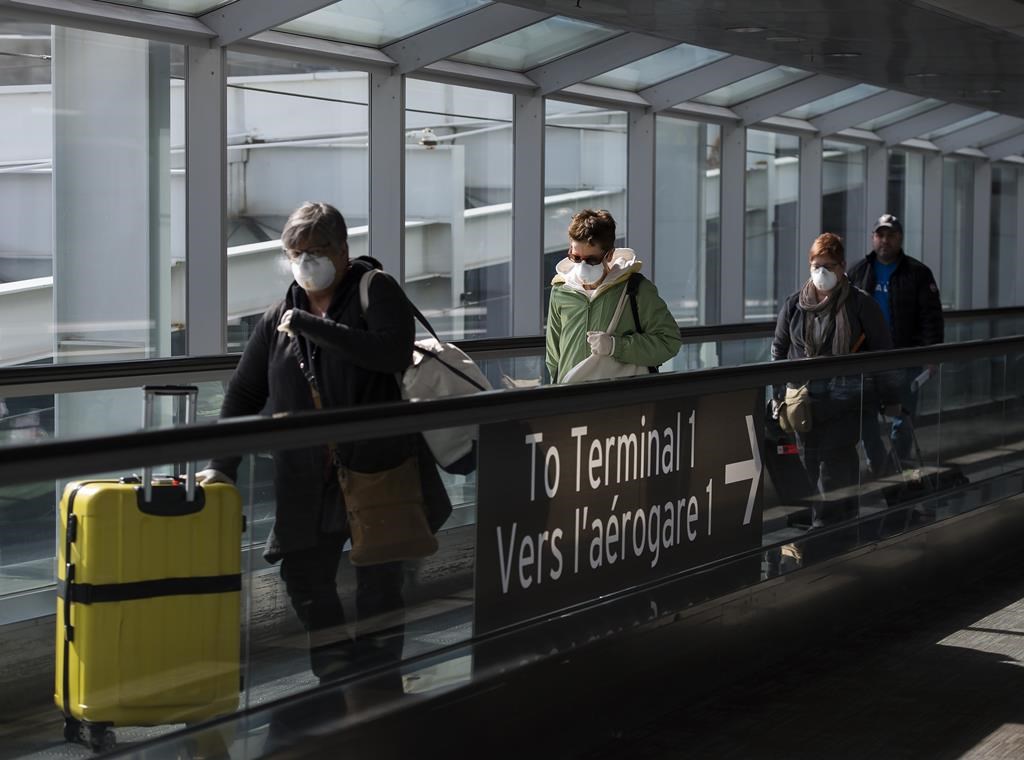
Canada is set to detail what quarantine rules citizens and permanent residents who are fully vaccinated against COVID-19 will soon have to follow when entering the country.
Public Safety and Emergency Preparedness Minister Bill Blair said last week that “measures” would be announced Monday that will apply to immunized Canadians, as well as foreign nationals who are permitted entry.
Currently, those without citizenship or resident status can enter the country only if their travel is related to work, school or other essential business, but not for leisure.
As more Canadians get inoculated against COVID-19 and summer weather has people itching to take some long-awaited trips, pressure is building for the Liberal government to begin relaxing some of its border and quarantine rules.
Over the weekend the country hit an important target of having 75 per cent of its eligible population receive one dose and 20 per cent get two, providing the latter group with full protection against COVID-19.
These were benchmarks Prime Minister Justin Trudeau and top health officials said needed to be met to safely relax pandemic-related health measures.
Those hoping to see some loosening this month were disappointed on Friday when the Liberal government announced its restrictions on non-essential international travel would remain in place at the Canada-U.S. border until July 21.
In the lead up to Monday’s announcement, the federal government spent the past week teasing at some of the travel changes it considered making for vaccinated Canadians and permanent residents.
Health Minister Patty Hajdu has said that starting in early July, the government looked to exempt fully vaccinated travellers from having to pay for a three-night stay at a government-approved hotel.
The sites are where Canadians entering the country by air, regardless of their vaccination status, must currently begin a 14-day quarantine while awaiting a negative result from a COVID-19 test required upon arrival.
Among the Canadians who recently went through the process was Trudeau himself, who’s currently in quarantine after spending five days in Europe attending international meetings with G7 and NATO leaders.
The prime minister said that in terms of being able to show border security some proof of vaccination, the country would rely on Canadians uploading images of their records to its ArriveCAN app, which is where returning travellers already have to share where they will stay for their 14 days of quarantine.
Both he and Hajdu say the country’s border rules would be relaxed in phases.
In particular, Hajdu has said the government intends those who are fully vaccinated to still be tested for COVID-19 before leaving for Canada and again on their return, where they would also need a plan for where to quarantine while awaiting a negative result.
An expert panel comprised mainly of doctors that studied Canada’s COVID-19 border measures recently recommended the government scrap hotel quarantines altogether for fully vaccinated travellers, provided they test negative for the virus and have proof they have been inoculated.
As for those with one dose, the doctors suggested travellers quarantine at home until receiving their negative COVID-19 test after having a swab done before departure.
And for those who haven’t been vaccinated at all, the panel said they should be allowed to leave quarantine if they test negative before departure, upon arrival and seven days into the full two-week self-isolation period.

Region of Waterloo Public Health is reporting the first COVID-19 related death in an individual who was fully immunized.
Officials say the victim was a woman in her 90s and was a resident of a long-term care facility currently experiencing an outbreak of the virus.
Dr. Rabia Bana, Associate Medical Officer of Health for the Region of Waterloo, emphasized that the death is a very rare outcome in fully immunized people.
In a news release, the region said it was working wit the long-term care facility to manage the outbreak and prevent further spread.
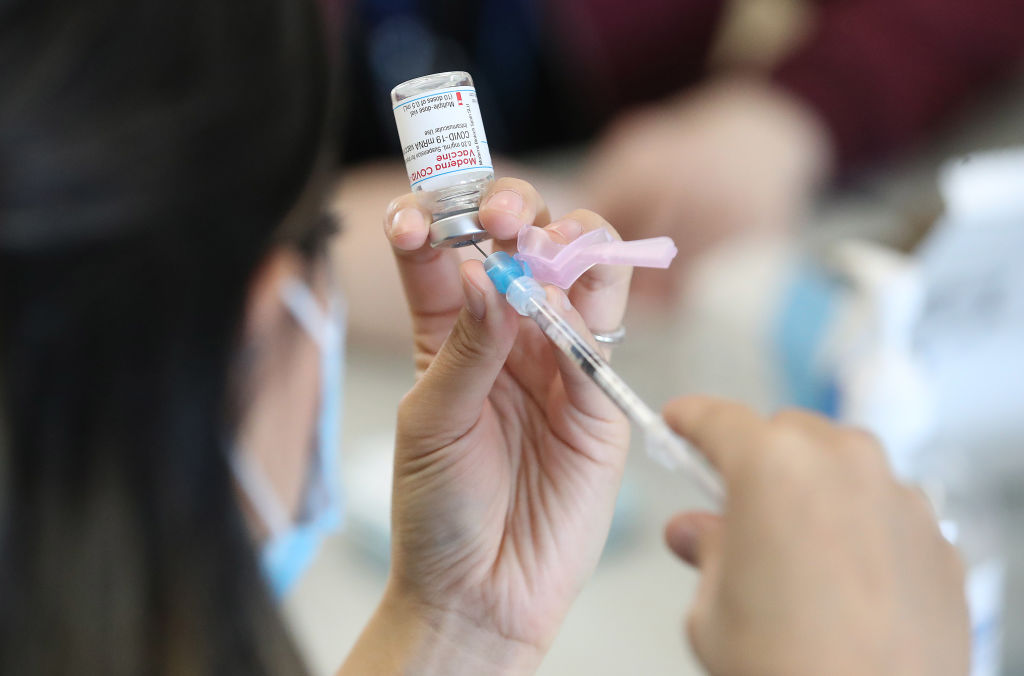
More Ontarians become eligible for an earlier second dose of COVID-19 vaccine this week.
Starting this morning at 8 a.m., those who received their first dose of an mRNA vaccine on or before May 9 can book or reschedule their second dose at a shortened interval.
People in Delta variant hot spots who received first shots on or before May 30 can move up their second shots on Wednesday.
Health units covering Toronto, Peel, Halton, Porcupine, Wellington-Dufferin-Guelph, Waterloo and York, Hamilton, Simcoe-Muskoka and Durham are considered hot spots for the more infectious variant.
The province says that starting sometime next week, it plans to allow all adults who received a first dose of Pfizer-BioNTech or Moderna’s product to book a second appointment as soon as 28 days after their initial shot.
As of last week, the province allowed people who received a first shot of the Oxford-AstraZeneca vaccine to book their second shot earlier.
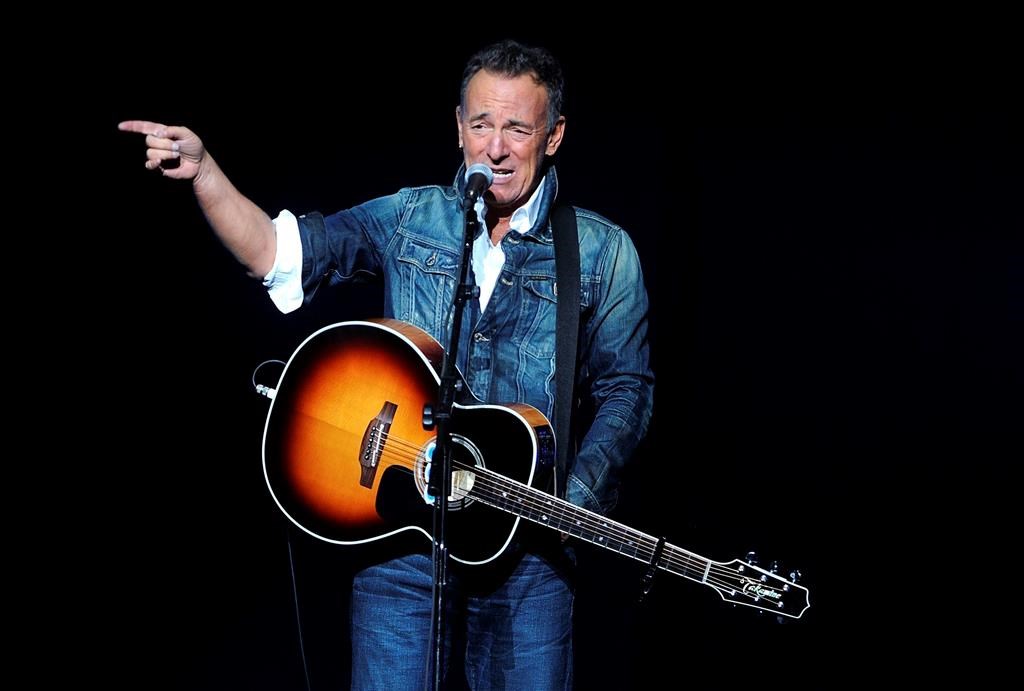
David Screech had already selected his seats and put in his credit card information for “Springsteen on Broadway” tickets when he noticed the COVID-19 vaccine requirements: his two doses of Oxford-AstraZeneca wouldn’t be enough for admission.
Screech, the mayor of View Royal, B.C., and a Springsteen fan of 40 years, received his second AstraZeneca dose last week, but the Jujamcyn Theaters’ website said it would only allow guests “fully vaccinated with an FDA-approved vaccine” — Pfizer-BioNTech, Moderna or Johnson & Johnson.
The New York venue held firm when Screech contacted them directly to ask about the requirement, turning his anticipation for the show into disappointment. While he’s “very grateful” to have two doses of an effective vaccine, Screech said he had some reservations about AstraZeneca, and the Broadway snub “certainly added to that.”
“Obviously our health is far more important than being able to go to shows or concerts. But the flip side of that is, shows and concerts have been a major part of my life,” Screech said.
“And the idea of not being able to go to them for the foreseeable future because of possibly getting the wrong vaccine is a little disappointing.”
“Springsteen on Broadway” isn’t the only New York City attraction holding guests to strict vaccination rules.
Live tapings of TV shows including “Saturday Night Live” and “The Late Show with Stephen Colbert” also snub AstraZeneca doses in rules listed on their websites, which say they’re acting “at the direction of New York State.”
The New York Islanders, currently in an NHL playoff series against the Tampa Bay Lightning, don’t appear to have the same restrictions. While the team’s website says fans need proof of vaccination “per New York State guidelines,” the arena also has “non-vaccinated sections.”
The offices of New York Gov. Andrew Cuomo, the New York State Department of Health and the Jujamcyn Theaters did not immediately return requests for comment.
Dr. Zain Chagla, an infectious disease physician in Hamilton, wasn’t surprised to see institutions begin enacting vaccine passports. But blocking AstraZeneca recipients from a Springsteen show seemed particularly cruel.
“If there’s something more painful you can do to Generation X, this is it,” Chagla said with a laugh.
Potential vaccine requirements for travellers could get even trickier if other countries begin forming rules based on their own authorized jabs, Chagla said.
A sense of vaccine nationalism could lead some to insist their authorized products are “the gold standard,” he added, noting that Johnson & Johnson, which was created with the same viral-vector technology as AstraZeneca, was slightly less effective in clinical trials.
“This is just a very arbitrary line in the sand, based on what the FDA approved, (without) recognizing that AstraZeneca is approved by many other health-care organizations around the world,” Chagla said.
“Private industries have the right to do what they want but at the same time we need to have larger discussions around what’s considered a fully immunized person, and with which vaccines.”
Dr. Theresa Tam, Canada’s chief public health officer, noted Thursday that “we’re in the early days of resuming travel.” She urged Canadians to look carefully at requirements in other countries and be prepared for shifting rules.
Tam said global discussions could help the world “come to a point where we can accept each other’s data … and look at a path forward that makes life easier and travellers supported, if they have been vaccinated, too.”
Chagla said Canadian AstraZeneca recipients may not face the same problems in Europe due to widespread use of the jab there, but he expected more U.S. states to adopt FDA-approved vaccine requirements.
That could mean more uncertainty and insult for some AstraZeneca recipients planning to travel south once the border re-opens, he said. Roughly two millions Canadians have received an AstraZeneca shot.
Chagla called for world leaders to establish a “benchmark” of potential vaccine requirements and give people confidence in their jab.
“You really want people to feel they’re making the right decision, they’re not going to be discriminated against, and they’ll have access to everything a vaccinated person should,” he said.
Andria Bianchi, a bioethicist and assistant professor at the University of Toronto’s school of public health, wondered about the justification for the Broadway show’s vaccine rule.
If the goal is to ensure no one with COVID-19 enters the building, relying strictly on FDA-authorized vaccine passports isn’t the only way to achieve that.
“I hope that when any place is developing policies or putting restrictions in place that they’re very well-thought out and all possible options are explored,” Bianchi said.
“I imagine there’s going to be a lot of AstraZeneca recipients frustrated and maybe feeling a sense of injustice.”
Screech said he hopes the “Springsteen on Broadway” rule will change to reflect that AstraZeneca provides solid protection against COVID-19.
“But there’s disappointment for sure, and a bit of worry about what it means for (other) U.S. venues in the future.”
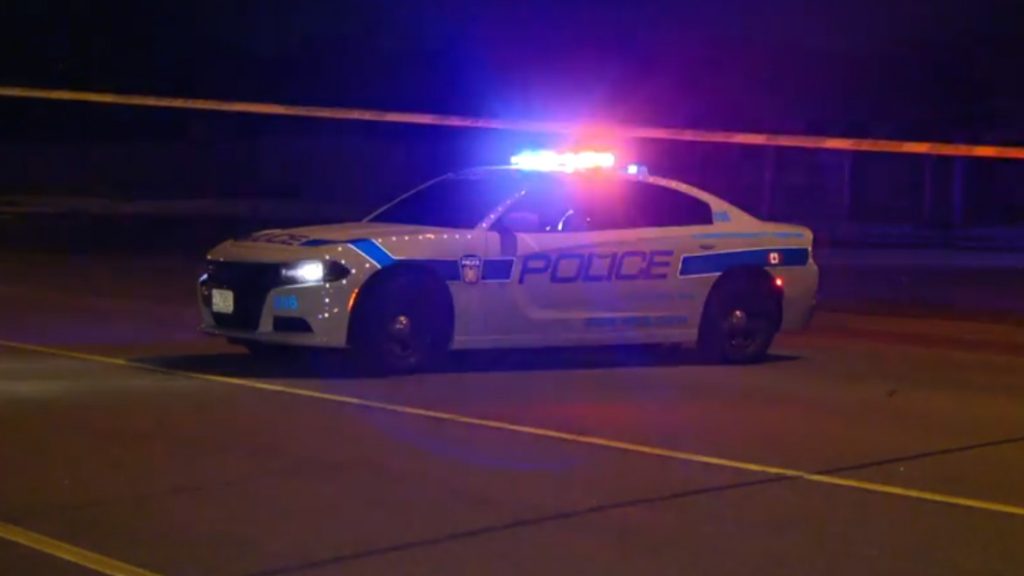
A man in his 60s is dead after he was struck by a vehicle while riding his bicycle in Brampton.
Emergency crews were called to Highway 50 and Queen Street East around 11:30 p.m. on Thursday.
The cyclist was rushed to hospital where he later died.
The driver of the vehicle remained at the scene.
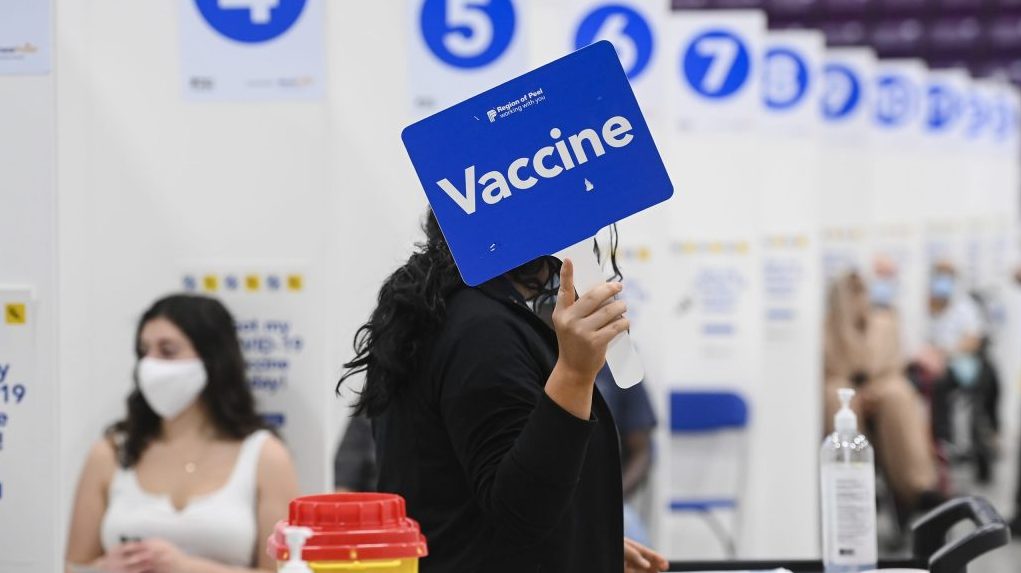
The National Advisory Committee on Immunization said Thursday people who got the Oxford-AstraZeneca vaccine as their first dose should get Pfizer-BioNTech or Moderna for their second shot.
On June 1, NACI had said AstraZeneca recipients “could” get Pfizer or Moderna for their second shot if they wanted, but Thursday went further to say an mRNA vaccine was the “preferred” choice.
“Since NACI first looked at mixed vaccine schedules, new evidence is starting to emerge suggesting immune responses are better when a first dose of the AstraZeneca vaccine is followed by an mRNA vaccine as a second dose,” said NACI vice-chair Dr. Shelley Deeks, in the new guidance documents.
NACI also updated its previous recommendation that people at high risk of exposure to, or serious illness from, COVID-19, could opt to get AstraZeneca rather than waiting for Pfizer or Moderna. Now NACI says everyone should always get the mRNA vaccines first, unless they are allergic to them.
Deeks said the advice is based on the growing supply of Pfizer and Moderna, and the risk of vaccine-induced blood clots associated with AstraZeneca. But she is still trying to reassure people who got one or two doses of AstraZeneca’s vaccine that they are nevertheless well protected.
“Anyone who has already received two doses of AstraZeneca/Covishield can rest assured that they are protected, particularly against severe illness,” she said. “There is no need for a third dose at this time.”
Dr. Theresa Tam, the chief public health officer of Canada, said the new evidence in favour of mixing different types of vaccines included four studies in Germany.
“It’s really the immunogenicity, that immune response, after that mixed-dose schedule that’s resulted in NACI updating this recommendation, because all the accumulated studies essentially suggest that immune response is a better response,” said Tam at a news conference in Ottawa.
One of those studies from Germany’s Saarland University, published early data Wednesday saying giving Pfizer as the second dose after AstraZeneca, or two doses of Pfizer only, generated far more antibodies and T cells as two doses of AstraZeneca.
The mixed-dose schedule was slightly better than two doses of Pfizer at producing the neutralizing antibodies and killer T cells that are critical to preventing infection or serious illness.
Quebec was not moving to follow NACI’s advice. Health Minister Christian Dube, who got two doses of AstraZeneca himself, said Quebec is still saying people can opt for a mixed schedule or two doses of AstraZeneca, depending on their personal choice.
Almost 25 million Canadians have now received at least one dose of vaccine, and almost six million are now fully vaccinated.
As of June 5, 2.1 million people had received one dose of AstraZeneca, and 15,186 had received two doses.
Canada has received 56 reports of blood clots following an AstraZeneca vaccination, and 38 are now confirmed as vaccine-induced thrombotic thrombocytopenia, or VITT.
There are no further shipments of AstraZeneca currently scheduled, but there are about 600,000 doses still left from previous deliveries.
There are 14 million doses of Pfizer-BioNTech and Moderna being delivered this week and next, including a donation of one million doses of Moderna’s COVID-19 vaccine from the United States that was to arrive in Canada Thursday night.
The donation won’t cost Canada anything, and will be on top of the 44 million doses Canada has purchased directly from Moderna.
It comes less than a week after Canada promised to donate 13 million doses to the COVAX vaccine-sharing alliance, which will entirely come from the remaining share of doses Canada had purchased from COVAX itself.
Canada has been heavily criticized for buying three times as many doses of COVID-19 vaccine than it needs and not sharing any doses from its own direct purchase agreements with vaccine makers. The World Health Organization has made repeated pleas for wealthier countries to share more doses with developing countries, some of whom have vaccinated very few people at all.
Canada expects to have fully vaccinated 75 per cent of all eligible Canadians – everyone over the age of 12 – by the end of July, and has administered 78 doses for every 100 Canadians. Across Africa, nations have given out three doses for every 100 people.
“Taking vaccines at a time when we are nearing complete vaccination when many developing countries are so far behind makes Canada a vaccine hoarder and leaves Canadians vulnerable to dangerous variants,” said NDP health critic Don Davies.
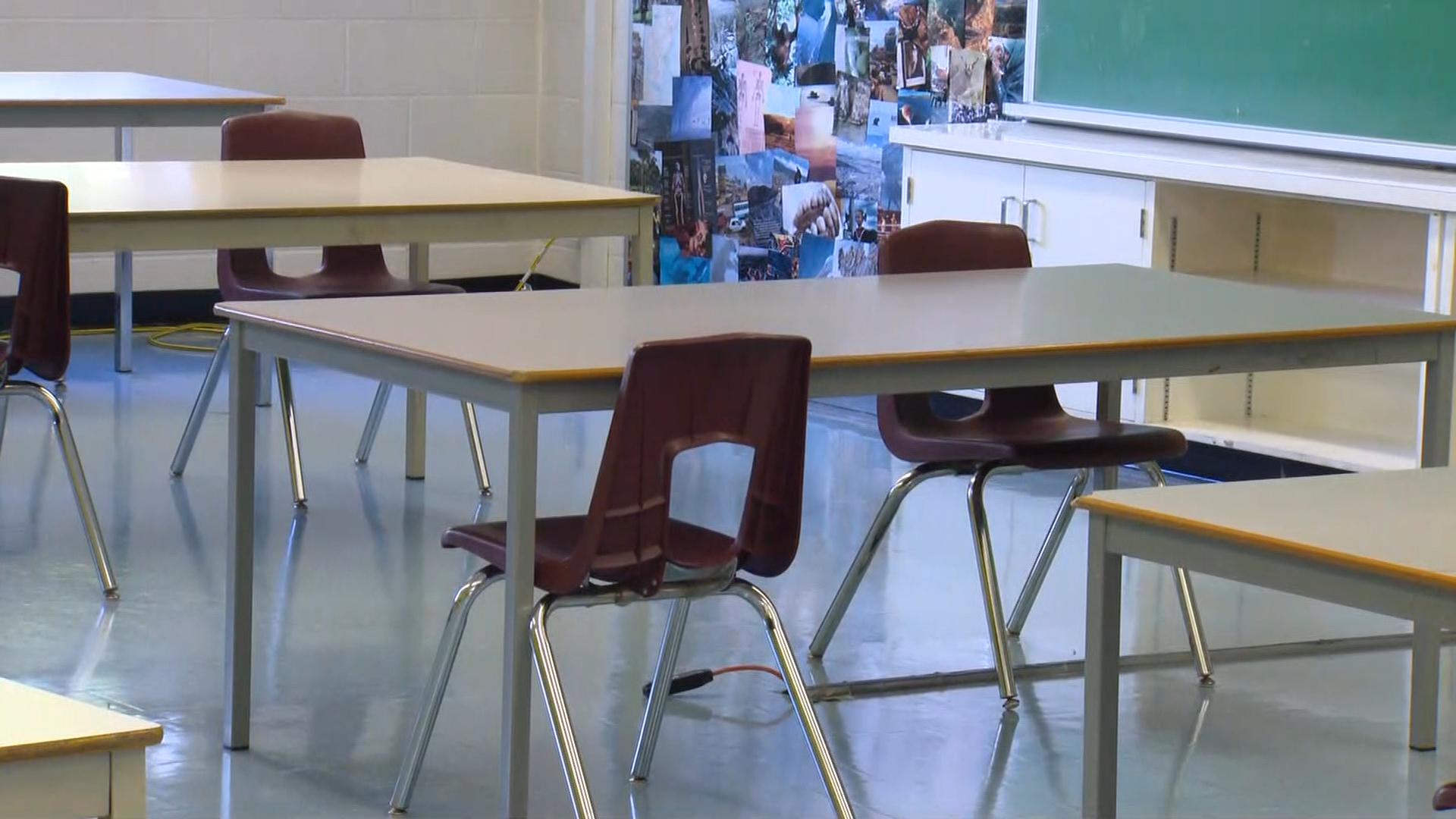
Some Ontario school boards plan to abandon the much-derided “quadmester” system for high schoolers come September, though students will still have to sit through extra-long classes.
The Toronto District School Board and Halton District School Board have told parents that they will go ahead with a “modified semester” system that would see students take four courses over a longer term, alternating which two classes they have each week.
“The modified semester offers more face-to-face time between students and teachers, encouraging an opportunity to build relationships and support an increased sense of belonging in class,” the Toronto board said in a message to parents.
“It also offers a slower pace by learning over a longer period of time than the quadmester model.”
Both the TDSB and HDSB said the plan has the Ministry of Education’s stamp of approval.
The move comes after the boards said the Ministry of Education directed them last month to continue with the quadmester system in order to prevent kids from mixing with too many of their peers, for fear they might spread COVID-19.
Quadmesters, put in place for the 2020-2021 school year, saw students take two courses at a time for a period of roughly nine weeks.
In lieu of that, said TDSB spokesman Ryan Bird, the board proposed the modified semester system as an alternative. The board is still determining how long a semester will be, but it will last longer than the quadmester’s nine weeks.
The pre-pandemic norm was 300 minutes of class time, often divided into 60-minute periods.
The Halton school board said it would prefer to offer standard semesters without the overlong classes.
The modified semester, running over 20 weeks, will allow them to switch to such a model partway through the academic year if the provincial government allows it, the HDSB told parents.
The TDSB, meanwhile, said it was motivated to find an alternative to quadmesters due to pushback from parents.
“We realize that this is not a perfect solution,” Bird said of the modified semesters. “But under the current guidelines, we’re trying to make it as close to normal as we can.”
There’s been a strong backlash to quadmesters from parents and students who say that it’s difficult to concentrate during lengthy classes, and the reduced timeframe for courses makes the workload unmanageable.
An online petition urging the province to ditch quadmesters and cohorts in September has garnered more than 15,000 signatures.
Joanne Pearson, the Collingwood, Ont., mom of three who started the petition, said it’s been a tough year for her sons.
“You’re compressing a curriculum into 10 weeks, so it’s been a real struggle,” she said. “Things like English, you’re now expected to read a novel and write an essay within a couple days timeframe.”
The modified semester system fixes some of the problems, giving students more time to complete assignments and study for tests, she said, but she thinks things should return to the pre-pandemic normal in September.
“These kids and these teachers will have two doses (of COVID-19 vaccine) by September,” Pearson said. “That’s happening quicker than we ever thought it could.”
A spokeswoman for Education Minister Stephen Lecce didn’t comment on the quadmester pushback or the modified semesters, but said the government wants things to get back to normal as quickly as possible.
“With all students aged 12+ and education workers prioritized for double vaccination prior to September, this will enable more flexibility and allow for a more normal in-class learning experience – including clubs, sports, and extra-curriculars,” Caitlin Clark said in an email, pointing to the province’s investments in the education sector.
The province is also requiring that all school boards offer a remote learning option for students come September, giving parents a choice about whether they feel safe sending their kids back to the classroom.









